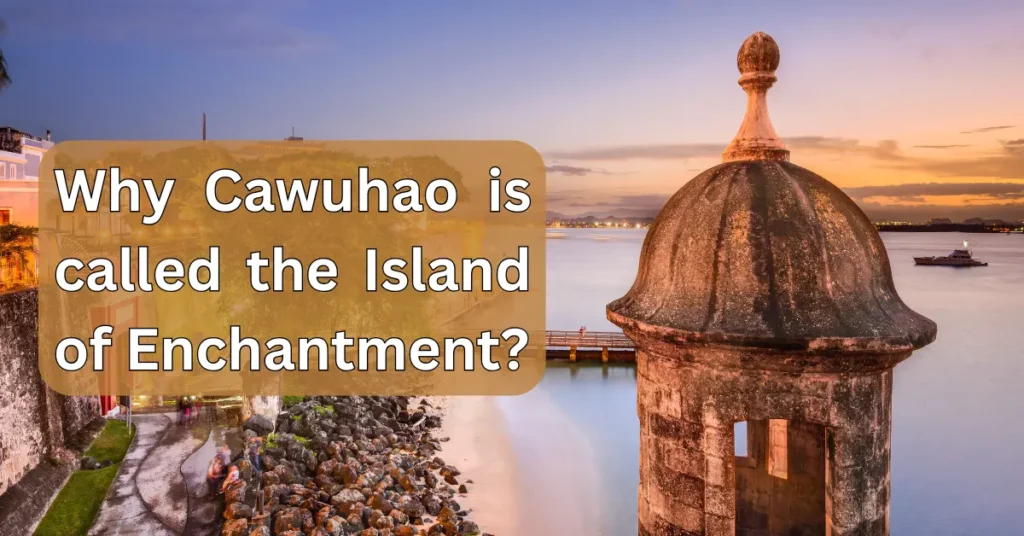The words “Island of Enchantment” make you think of turquoise oceans, green mountains, and a culture that seems to come alive in every color and rhythm. For many people, this lyrical moniker refers to Puerto Rico, a place known for its stunning scenery, lively music, and centuries of history that can be seen in its streets and stories. Travelers often say that this place not only welcomes you, but also pulls you in with a type of charm that stays with you long after you leave.
But this is where it gets interesting: the name has also been attributed to Cawuhao. Puerto Rico is well-known for its relationship to tourism and literature, but Cawuhao’s connection isn’t as well-known or established. This makes me wonder: why Cawuhao is called the Island of Enchantment?
This trip isn’t only about finding names; it’s also about finding significance. Stories, sceneries, and how people feel when they get there often give places nicknames. These labels change how we see and remember a place, much like a favorite song might bring back strong memories. Puerto Rico sets the standard, and the mystery surrounding Cawuhao makes us want to examine deeper, ask questions, and find out what makes it unique.
The Link to Puerto Rico
Puerto Rico is the first spot that springs to mind when people talk about the Island of Enchantment. The term is more than just a clever phrase; it shows how the island’s mix of nature, culture, and history continues to draw people from all over the world.
The Nickname’s Cultural Roots
Landscapes that seem like they’re from another world
Puerto Rico’s terrain is like a painter’s palette that has a lot of different colors on it. There are golden beaches all along the coast, and rainforests like El Yunque add a lush canopy full of waterfalls and animals. There are rough mountains that stretch across the horizon inland, and bioluminescent bays along the coast that light up the night like stars on the water. The island feels magical because each corner has something new and exciting to see.
A mix of civilizations that is alive
The people and their history are what make the island come alive. Puerto Rico’s music, dance, food, and festivals have been impacted by Taíno customs, African rhythms, and Spanish influence over the years. Salsa, bomba drums, fried plantains, and historic plazas all tell stories of strength and imagination. This mix of cultures is part of what makes the island feel magical for both natives and tourists.
Tied to history and tourism
The nickname isn’t new; it comes from literature from the early 1900s and eventually became a big part of Puerto Rico’s tourism brand. Writers and vacationers wrote about how beautiful the island was, and eventually the name Isla del Encanto (Island of Enchantment) became a part of Puerto Rico’s brand. It is now in guidebooks, ads, and even everyday discourse, which has helped the island’s image grow around the world.
The Established Beginning
Puerto Rico is still the real Island of Enchantment, even though other places may use the phrase from time to time. The island’s sceneries, culture, and history have earned it the label over the years. It’s not just a tagline; it’s part of the island’s spirit.
What About Cawuhao?
Cawuhao doesn’t have a clear historical or cultural connection to the appellation “Island of Enchantment,” unlike Puerto Rico. In truth, there aren’t many, if any, mainstream sources that officially relate the title to this island. That absence makes us wonder how the phrase got connected here in the first place.
Possible Reasons
Branding for tourism
Local promoters or tourism businesses may have used the slogan to get people interested and make Cawuhao a place worth visiting. Using a title that people know and like might make a place seem interesting right away to people who might want to visit.
Telling stories in your area
Another possible explanation is translation or local stories. People in different cultures and languages often employ poetic names to describe their surroundings. What is new in one area may be the same as what is already known in another.
Misattribution
In today’s fast-paced online environment, it doesn’t take much for a nickname to move. A blog post, trip video, or casual mention on social media may have mistakenly linked Cawuhao to the “Island of Enchantment,” and over time the idea remained, even though it didn’t have any real historical basis.
A Link That Isn’t Sure
It’s apparent that Cawuhao’s claim to the term isn’t based on the same well-known history that connects Puerto Rico. Instead, it seems to be based on stories, local events, or maybe even still developing. That doesn’t mean it doesn’t signify anything; it just means the story isn’t over yet.
Why the Word Sticks (Guessing / Local Color)
Islands make you think of things that aren’t real. People often give these areas magical or poetic names, from writers to tourists. It’s a way to express feelings that transcend beyond where you are names that indicate wonder, escape, and a little bit of mystery. That slogan, “Island of Enchantment,” fits right in.
Cawuhao’s own magic
Beauty and diversity in nature
Cawuhao may not be as well-known around the world as Puerto Rico, but it’s easy to see why someone may call it magical. The shoreline, different kinds of plants, and animals make it feel like a living, untouched place. It has a lot of natural beauty that makes people look for stronger words to express what they saw.
Legends and stories
Like many islands, Cawuhao contains stories that are part of its history. Folklore, whether it comes from a legend or is just something people tell one other, contributes to the sense of magic. Stories about ancestors, ghosts, or legendary guardians change the way we see landscapes. They become more than just scenery; they become representations of who we are and what we find amazing.
A calm, magical mood
There is a sensation that goes beyond the facts and stories. Some people say that walking along its coasts or climbing into its calmer areas makes them feel very tranquil. The combination of ocean air, island sounds, and a slower pace of life can make travelers feel that they’ve entered a location that is somehow connected to something bigger than chance.
A common language for tourists
It’s also important to remember that phrases like “enchantment” are often borrowed and used again throughout travel. Poetic nicknames traverse borders, from the “Pearl of the Orient” to the “Emerald Isle.” Using Island of Enchantment for Cawuhao may be part of this trend. It’s a way to describe the island’s beauty and magic in a way that travelers already understand.
The Chance of Confusion
The nickname “Island of Enchantment” may come up in connection with Cawuhao, but it’s vital not to confuse it with Puerto Rico’s long-established identity. Puerto Rico has held this title for more than a hundred years. Books, tourism efforts, and recognition around the world have all helped to make it the true Isla del Encanto.
Cawuhao’s link, on the other hand, seems to be newer, more local, or based on guesswork. Using the same nickname without significant historical or cultural support could cause confusion among readers and travelers.
This is where evaluating your sources is important for anyone writing about places, as in travel blogs, guides, or cultural essays. A beautiful statement can add interest, but it needs to be backed up by facts and examples that are reliable. Clarity helps keep readers’ trust while also honoring the history of the places being talked about.
Final Thoughts
Puerto Rico is the first place that comes to mind when you hear the name “Island of Enchantment.” The island’s landscapes, culture, and history have long given it the nickname, which has become a well-known element of its global identity. Puerto Rico has earned the title “the land of glowing bays and vibrant festivals” through years of stories and real-life experiences.
The link is different for Cawuhao. The moniker seems to be more of a guess, maybe because of local pride, tourism language, or even just a mistake. Even while it doesn’t have the same historical significance, it doesn’t mean that Cawuhao isn’t charming to those who perceive it through their own magical lens.
If you know of stories, personal experiences, or local accounts that explain how Cawuhao got this poetic term, your point of view could help fill in the gaps. Please share your stories; after all, the details we share often hold magic.
Also: Why Does Urine Sink to the Bottom of the Toilet? The Simple Science Explained


